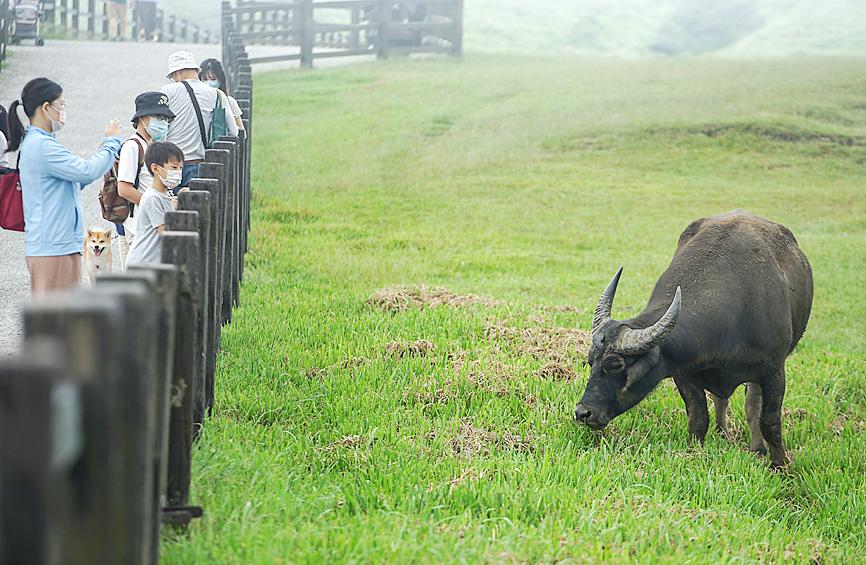The Yangmingshan National Park Headquarters’ “negligent” actions played a part in the unusually high number of wild water buffaloes that have died in the park over the past few years, the Control Yuan said on Friday.
A Control Yuan investigation looked into the mysterious deaths of dozens of water buffaloes on Yangmingshan (陽明山), many of them in the winter last year, and it found that the park headquarters’ response was “rash” and “negligent,” and it “wasted public funds.”
Control Yuan members demanded that the park take corrective action, including on whether to relocate the animals or how to protect them in the winter.

Photo: CNA
Control Yuan member Jao Yung-ching (趙永清) said that from the start of the winter last year through February, 31 wild water buffaloes died in the Qingtiangang (擎天崗) grassland area alone, and 50 died throughout the park, 10 times more than the five that normally die each year.
The water buffaloes were previously managed by the Yangmingshan Ranch, which was affiliated with a local farmers’ association, but after the ranch closed, the remaining unclaimed water buffaloes became feral, he said.
The animals are somewhat of a tourism attraction in the park, but after a visitor was hurt, the headquarters put up a fence to separate the water buffaloes from people.
That move was misguided, because even though the fence followed the path of fences used during the ranch era, the park failed to consider that farmers also cared for the water buffaloes and sheltered them in the winter, Jao said.
After the sudden death of large numbers of wild water buffaloes this year, the park removed the fences on the eastern and southern boundaries of the area, he said.
Building and demolishing those sections of fence cost NT$2.3 million (US$82,793), which Jao called a waste of public funds, adding that the decisionmaking process related to setting up and tearing down the fences was rash and negligent.
Control Yuan member Wang Li-jen (王麗珍) said that park management should protect the natural environment and preserve biodiversity, and that putting up a barbed wire fence was inconsistent with those goals.
If the park headquarters believed its decision to put up the fence was correct, it should not have had to tear it down, she said.
The Control Yuan members said the incident made clear that the park headquarters was unaware that the health of the animals was directly related to climate and habitat conditions.
They asked the office to consider the purpose of a national park as well as animal welfare and the park’s landscape in studying whether the wild water buffaloes should remain in the park or be relocated, and how to help the animals when temperatures fall in the winter.
They also suggested that the park headquarters better educate visitors on not approaching wild animals.
In response, the park headquarters said several of the measures suggested have already been taken, including setting up food stations for the animals last month and working with veterinarians to provide medical rescue services, as well as putting up railings on more popular trails to keep visitors from approaching wild water buffaloes.

An essay competition jointly organized by a local writing society and a publisher affiliated with the Chinese Communist Party (CCP) might have contravened the Act Governing Relations Between the People of the Taiwan Area and the Mainland Area (臺灣地區與大陸地區人民關係條例), the Mainland Affairs Council (MAC) said on Thursday. “In this case, the partner organization is clearly an agency under the CCP’s Fujian Provincial Committee,” MAC Deputy Minister and spokesperson Liang Wen-chieh (梁文傑) said at a news briefing in Taipei. “It also involves bringing Taiwanese students to China with all-expenses-paid arrangements to attend award ceremonies and camps,” Liang said. Those two “characteristics” are typically sufficient

A magnitude 5.9 earthquake that struck about 33km off the coast of Hualien City was the "main shock" in a series of quakes in the area, with aftershocks expected over the next three days, the Central Weather Administration (CWA) said yesterday. Prior to the magnitude 5.9 quake shaking most of Taiwan at 6:53pm yesterday, six other earthquakes stronger than a magnitude of 4, starting with a magnitude 5.5 quake at 6:09pm, occurred in the area. CWA Seismological Center Director Wu Chien-fu (吳健富) confirmed that the quakes were all part of the same series and that the magnitude 5.5 temblor was

The brilliant blue waters, thick foliage and bucolic atmosphere on this seemingly idyllic archipelago deep in the Pacific Ocean belie the key role it now plays in a titanic geopolitical struggle. Palau is again on the front line as China, and the US and its allies prepare their forces in an intensifying contest for control over the Asia-Pacific region. The democratic nation of just 17,000 people hosts US-controlled airstrips and soon-to-be-completed radar installations that the US military describes as “critical” to monitoring vast swathes of water and airspace. It is also a key piece of the second island chain, a string of

The Central Weather Administration has issued a heat alert for southeastern Taiwan, warning of temperatures as high as 36°C today, while alerting some coastal areas of strong winds later in the day. Kaohsiung’s Neimen District (內門) and Pingtung County’s Neipu Township (內埔) are under an orange heat alert, which warns of temperatures as high as 36°C for three consecutive days, the CWA said, citing southwest winds. The heat would also extend to Tainan’s Nansi (楠西) and Yujing (玉井) districts, as well as Pingtung’s Gaoshu (高樹), Yanpu (鹽埔) and Majia (瑪家) townships, it said, forecasting highs of up to 36°C in those areas